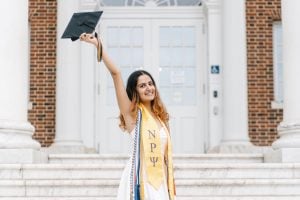
Ikshu Pandey ’24, has earned a U.S. Fulbright Scholarship and will study at the University of Bern in Switzerland during the ‘24-’25 academic year. Pandey, a materials science and engineering and neuroscience double major, aims to use her experience abroad as preparation for medical school. She reflects on how her time at Hopkins led her to pursue a Fulbright scholarship and her plans for her future.
1. What led you to apply for a Fulbright scholarship?
I came to Hopkins in the middle of the pandemic and couldn’t study abroad on a timeline that worked with my majors and pre-medical course load. While searching for opportunities to work abroad post-grad, the Fulbright Research Scholarship caught my eye because it will allow me to immerse myself in Swiss culture, connect with a cohort of scholars from around the world, and continue my research from Hopkins. My specific research has the potential for cross-cultural exchange between my lab at Hopkins and the lab I will be studying at while in Bern, which further convinced me to apply.
2. What are your main areas of research? How did you choose where to study?
I will be conducting research at the intersection of materials science and neuroscience, just as I did in Professor Peter Searson’s lab at Hopkins. My work will focus on extending my senior design research on the brain barriers in Alzheimer’s Disease; using animal models and three-dimensional synchrotron datasets, I will study the choroid plexus barrier and determine how it contributes to the neuroinflammatory side effects of Alzheimer’s.
When deciding where to go, I knew I wanted to be at a place with cutting-edge research just like Hopkins. Switzerland is a neuroscience hub—after all, it is the country where the term “blood-brain barrier” was coined. I’ll study under the guidance of Dr. Britta Engelhardt, a renowned expert in barrier research. The opportunity to have her mentorship and study at the University of Bern was ultimately invaluable to me.
3. What do you hope to learn while you’re abroad?
In the lab, I hope to learn how to spearhead a brand-new research project by myself. Through the senior design program, I improved in my lab and took ownership of an area in a graduate student’s work, and I’m excited to see how these skills translate to novel research of my own!
Outside of work, I’m excited to learn more about the Swiss disability advocacy scene. I hope to volunteer at SZBlind, an organization that works to help the deafblind population navigate life. I also hope to continue to improve my French and adore cooking, so I will be working to incorporate Swiss cuisine—maybe Bern’s famous meringues and Zibelechueches (onion tarts)—into my meals!
4. How do you anticipate these experiences helping you in medical school and beyond? What excites you about your “gap year”?
Medical students need global perspectives—I’ll likely never treat only one ethnic demographic or serve patients who have very similar experiences. Being abroad will expose me to a multitude of new people, beliefs, and cultures, especially since Switzerland is a melting pot of Swiss-German, French, and Italian speakers. This will help further develop my cultural humility and likely teach me more about health care disparities, while also helping me better connect with people who have different identities from my own.
I am excited to travel around the country, I’ve heard great things about the natural beauty of Switzerland—and the Alps—from my mentors and previous JHU Fulbright Scholars, so I cannot wait to experience them for myself!